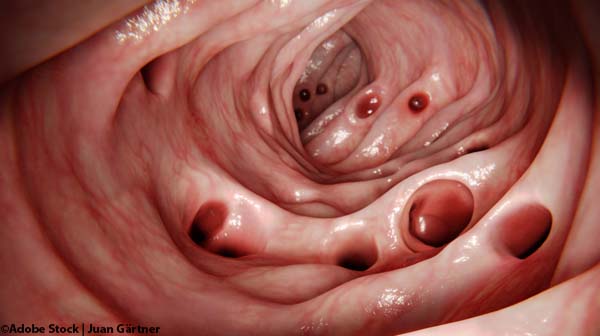
Not all patients with acute, uncomplicated diverticulitis need antibiotics. This practice is not cutting-edge—it is ready for retirement. Although antibiotics have been considered the cornerstone of the treatment of acute, uncomplicated diverticulitis, this practice was based on anecdotes and plausibility rather than empirical data that antibiotics were necessary. Now that we have quality data, however, it is clear that this practice pattern did not necessarily generate improved patient outcomes.
Explore This Issue
ACEP Now: Vol 42 – No 04 – April 2023The idea of withholding antibiotics for uncomplicated diverticulitis in all but a select group of patients has been brewing for years. In fact, this was covered in an ACEP Now article over half a decade ago, shortly after the American Gastroenterological Association published a recommendation that antibiotics not be given routinely in acute, uncomplicated diverticulitis.1,2 At that time, two randomized trials demonstrated the safety of observation in select patients.3,4 Now, in 2023, all major professional-society guidelines recommend only selective use of antibiotics in patients with acute uncomplicated diverticulitis rather than all comers.2,5,6
What is the Evidence for Symptomatic Treatment Without Antibiotics in Select Patients?
There are several randomized and observational studies supporting treatment without antibiotics in select emergency department (ED) patients.3,7–10 The two largest trials of ED patients are the DIABOLO and DINAMO studies. The DIABOLO open-label randomized trial analyzed 528 ED patients with acute, uncomplicated first-time diverticulitis to either observational treatment or antibiotics (48 hours of intravenous amoxicillin-clavulanic acid followed by 8 days of oral antibiotics). Interestingly, 8 percent of patients in this study had diverticulitis with a pericolonic abscess of less than five cm. The median time to recovery was 14 days without antibiotics and 12 days with antibiotics and met the criteria for non-inferiority. On long-term follow-up (two years), outcomes remained similar between groups. Recurrent diverticulitis occurred in a nearly identical number of patients (no antibiotics, 15.4 percent versus antibiotics 14.9 percent,) and fewer than 5 percent in each arm had complicated diverticulitis.9
Most recently, the DINAMO study randomized 488 ED patients, aged 18–80 years, with acute uncomplicated diverticulitis without significant comorbidities to no antibiotics and symptomatic treatment or amoxicillin-clavulanic acid and symptomatic treatment. The primary outcome, hospitalization, met non-inferiority criteria, as 3.3 percent in the no-antibiotic arm were hospitalized compared with 5.8 percent in the antibiotic arm (difference 2.58 percent [95 percent CI, 6.32 to -1.17 percent]). There were no significant differences between groups in ED revisits (no antibiotics 6.7 percent versus antibiotics 7 percent) or pain at follow-up on days 2, 7, 30, and 90. Interestingly, fewer than half of the patients in the no antibiotic group who returned to the ED were subsequently prescribed antibiotics.8
Which Patients are Eligible for Initial Treatment without Antibiotics?
The list of those who should receive antibiotics is intuitive—patients with high-risk comorbidities or those patients with severe diverticular disease. In the randomized trials supporting the guideline recommendations, patients could have clinical signs of inflammation (fever, leukocytosis, tachycardia); however, patients could not have signs of sepsis or more than one of these features. Perhaps surprisingly, elderly patients do not automatically fall into a high-risk category. The DIABOLO trial did not have an upper age limit for exclusion and the DINAMO study randomized patients up to age 80. Further, updated guidelines from the World Society of Emergency Surgery recommend that antibiotics be avoided in elderly immunocompetent patients with acute, uncomplicated diverticulitis.11
In medicine, particularly in the United States, we have a preference for aggressive, interventional treatment—more is often conflated with better. As a result, the de-implementation of low-value treatments is particularly difficult for clinicians. There are several potential avenues that may ease the change brought by these guidelines and help clinicians provide high-quality care to patients.
- Share the plethora of national professional society guidelines with your group to help establish local practice patterns.
- Develop a quick script for patients who meet the criteria for non-antibiotic treatment that pre-empts expectations for antibiotics and establishes confidence in non-antibiotic treatment (e.g., recommended by specialists who focus on diverticular disease).
- Provide symptomatic treatment with analgesia.
- Consider a “wait and see” prescription and guidance for select patients.
Follow the QR code for more: 
 Dr. Westafer (@Lwestafer) is an attending physician and research fellow at Baystate Medical Center, clinical instructor at the University of Massachusetts Medical School in Worcester, and co-host of FOAMcast.
Dr. Westafer (@Lwestafer) is an attending physician and research fellow at Baystate Medical Center, clinical instructor at the University of Massachusetts Medical School in Worcester, and co-host of FOAMcast.
References
- Radecki RP, MS. Antibiotics, hospital admission may not help uncomplicated diverticulitis. ACEP Now. Published February 12, 2016. Accessed February 3, 2023. https://www.acepnow.com/article/antibiotics-hospital-admission-may-not-help-uncomplicateddiverticulitis/.
- Stollman N, Smalley W, Hirano I, AGA Institute Clinical Guidelines Committee. American Gastroenterological Association Institute guideline on the management of acute diverticulitis. Gastroenterology. 2015;149(7):1944-1949.
- Chabok A, Påhlman L, Hjern F, Haapaniemi S, Smedh K, AVOD Study Group. Randomized clinical trial of antibiotics in acute uncomplicated diverticulitis. Br J Surg. 2012;99(4):532-539.
- Daniels L, Ünlü Ç, de Korte N, et al. Randomized clinical trial of observational versus antibiotic treatment for a first episode of CT-proven uncomplicated acute diverticulitis. Br J Surg. 2017;104(1):52-61.
- Qaseem A, Etxeandia-Ikobaltzeta I, Lin JS, et al. Diagnosis and management of acute left-sided colonic diverticulitis: a clinical guideline from the American College of Physicians. Ann Intern Med. 2022;175(3):399-415.
- Hall J, Hardiman K, Lee S, et al. The American Society of Colon and Rectal Surgeons clinical practice guidelines for the treatment of left-sided colonic diverticulitis. Dis Colon Rectum. 2020;63(6):728-747.
- Azhar N, Aref H, Brorsson A, et al. Management of acute uncomplicated diverticulitis without antibiotics: compliance and outcomes -a retrospective cohort study. BMC Emerg Med. 2022;22(1):28.
- Mora-López L, Ruiz-Edo N, Estrada-Ferrer O, et al. Efficacy and safety of nonantibiotic outpatient treatment in mild acute diverticulitis (DINAMO-study): a multicentre, randomised, open-label, noninferiority trial. Ann Surg. 2021;274(5):e435-e442.
- van Dijk ST, Daniels L, Ünlü Ç, et al. Long-Term effects of omitting antibiotics in uncomplicated acute diverticulitis. Am J Gastroenterol. 2018;113(7):1045-1052.
- Jaung R, Nisbet S, Gosselink MP, et al. Antibiotics do not reduce length of hospital stay for uncomplicated diverticulitis in a pragmatic double-blind randomized trial. Clin Gastroenterol Hepatol. 2021;19(3):503-510.e1.
- Fugazzola P, Ceresoli M, Coccolini F, et al. The WSES/SICG/ACOI/SICUT/AcEMC/SIFIPAC guidelines for diagnosis and treatment of acute left colonic diverticulitis in the elderly. World J Emerg Surg. 2022;17(1):5.
Pages: 1 2 3 | Multi-Page




2 Responses to “Stop Prescribing Antibiotics for Diverticulitis”
April 23, 2023
DomangueWho uses Augmentin for diverticulitis? I’m trying to understand the value of these studies – I see none.
July 24, 2023
Will GradMany of us do. There is evidence that it may be safer while just as effective. One pill instead of 2 may also increase compliance, and, metronidazole can be a tough pill to take for some people.
Here’s an example of just one paper relating to this issue: https://www.acpjournals.org/doi/abs/10.7326/M20-6315?journalCode=aim